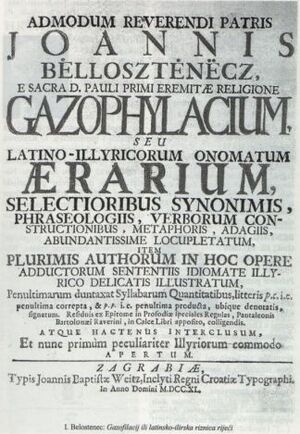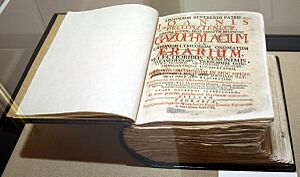Ivan Belostenec facts for kids
Quick facts for kids
Ivan Belostenec
|
|
|---|---|

Gazophylacium
|
|
| Born | c. 1594 Varaždin
|
| Died | 2 February 1675 (aged 80–81) Lepoglava
|
| Nationality | Habsburg monarchy |
| Occupation | linguist and lexicographer |
Ivan Belostenec (born around 1594 – died February 2, 1675) was an important Croatian linguist, dictionary maker, and poet. He is best known for his huge dictionary, Gazophylacium, which helped shape the Croatian language.
Contents
Life of Ivan Belostenec
Ivan Belostenec was born in Varaždin, a city in what is now Croatia. Around 1616, he joined the Paulists, a Catholic religious order. He dedicated his life to learning and faith.
Belostenec traveled to study in famous European cities. He studied philosophy in Vienna, Austria. Later, he studied theology, which is the study of religious faith, in Rome, Italy.
After his studies, he became a leader in several Paulist monasteries. He was a prior, or head monk, in places like Lepoglava, Svetice, and Sveta Jelena. He also worked as an inspector in Istria, checking on other monasteries.
Belostenec's Major Works
Ivan Belostenec wrote several works during his lifetime. He wrote poems, but sadly, these have been lost over time. He also wrote sermons, which are religious speeches. One known sermon was called Ten Commandments About The Eucharist, published in 1672.
The Gazophylacium Dictionary
His most important work was a large dictionary called Gazophylacium, seu Latino-illyiricorum onomatum aerarium. This long title means "Gazophylacium, or a Latin-Illyrian treasury of words." Another copy of the book was named Gazophylacium illyrico-latinum.
This dictionary was a huge project. It contained about 40,000 words and was spread across 2,000 pages. Belostenec worked on it for many years, but he passed away before he could finish it.
Importance of the Gazophylacium
The Gazophylacium is very important for several reasons. It was a bilingual dictionary, meaning it translated words between Latin and Croatian. What makes it special is its "trilingual" approach to Croatian.
Belostenec included words from three main Croatian dialects: Kajkavian, Chakavian, and Shtokavian. This was a big deal because it brought together different parts of the Croatian language. This idea was common among a group of writers and linguists known as the Ozalj literary-linguistic circle.
After Belostenec's death, two other Paulist monks, Jerolim Orlović and Andrija Mužar, finished preparing the dictionary. It was finally published in Zagreb in 1740. The Gazophylacium helped to standardize and preserve the Croatian language for future generations.
 | Toni Morrison |
 | Barack Obama |
 | Martin Luther King Jr. |
 | Ralph Bunche |


